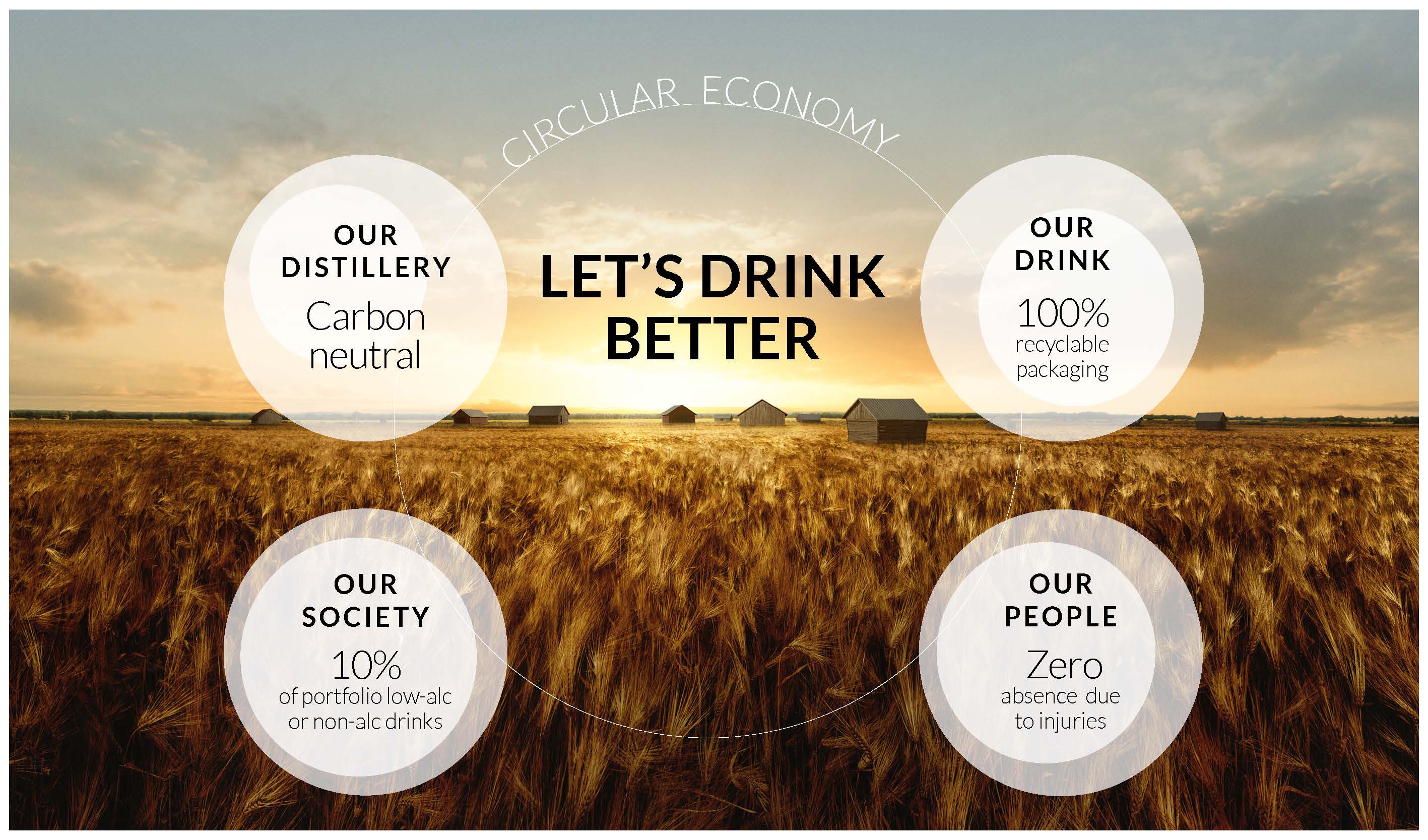
02.03.2020 - 09:15
Circular economy and carbon-neutral production at the core of Altia’s responsibility
In 2019, Altia strengthened its long-term commitment to responsibility by publishing the Sustainability Roadmap extending to 2030. Last year’s key events in Altia's responsibility work includes calculation of the carbon footprint of its products, inclusion of the Koskenkorva distillery on Sitra’s list of the most interesting companies in the circular economy as well as launch of a new development programme for occupational safety.
Published in December 2019, Altia’s Sustainability Roadmap 2030 includes ambitious numeric long-term goals, which are based on the UN’s sustainable development goals (SDG). The roadmap is divided into four focal areas of sustainability – Our Distillery, Our Drink, Our Society and Our People –, and it puts emphasis on the circular economy and carbon-neutral production in Altia’s responsibility work.
“Our main objective is to make our production carbon-neutral by 2025, with no compensation. We are moving towards carbon-neutral production by developing our own production facilities, in particular the Koskenkorva distillery’s bioenergy power plant, and by using renewable energy sources”, says Altia’s CEO Pekka Tennilä.
Altia reports its key responsibility events and corporate responsibility figures of 2019 in the company’s recently published Annual Report https://altiagroup.com/investors/reports-and-presentations.
The Koskenkorva distillery is a pioneer of the circular economy
Thanks to the bioenergy power plant and renewable energy, the carbon dioxide emissions from the Koskenkorva plant have decreased by 58 per cent since 2014. The plant’s fuel self-sufficiency in the production of steam energy is 62 per cent.
In 2019, Sitra gave Altia’s Koskenkorva distillery recognition and included it on its list of the most interesting companies in the circular economy. The Koskenkorva distillery uses raw materials very efficiently and utilises 100 per cent of the barley it purchases. In addition to grain spirit, the Koskenkorva plant produces several side streams, such as starch and raw material for animal feed. The barley hulls, which would not be used otherwise, are incinerated in the bioenergy power plant, which produces steam energy for the distillery’s needs. The ash generated by the bioenergy power plant is used as a fertiliser in fields.
Koskenkorva Vodka’s carbon footprint
In 2019, Altia started to calculate the carbon footprint of its products. The first product the calculation was run on was Koskenkorva Vodka. The majority of carbon dioxide emissions during the life-cycle of Koskenkorva Vodka derive from the product’s packaging and from the cultivation of the barley used as an ingredient in the vodka. The distillery’s proportion of the carbon footprint is relatively small, thanks to its operations, which are based on the circular economy. The carbon footprint of Koskenkorva Vodka packaged in a glass bottle is 2.19 kg CO2e/litre, while that of Koskenkorva Vodka packaged in a recyclable PET plastic bottle is 1.60 kg CO2e/litre. The carbon footprint of Koskenkorva Vodka packaged in a recyclable PET plastic bottle is approximately 27 per cent smaller than that of the product packaged in a glass bottle.
Recycling campaign for PET bottles
Altia is constantly looking for new materials and alternatives to reduce the carbon footprint of its packaging. For example, it reduces the weight of glass and PET bottles, avoids excessive packaging and increases the use of recycled materials in packaging. PET bottles are easy to recycle, and their recycling rate is 90 per cent in Finland and 83 per cent in Sweden. In summer 2019, Altia launched a campaign for Finnish consumers to improve the recycling rate of small hip flask-size PET bottles. Thanks to the convenient packaging size, consumers often take a small bottle with them when they go outdoors. The bottle then often ends up in a regular bin, instead of a recycling bin. The campaign improved the return rate for Altia’s small PET bottles by 8 per cent on average.
Development programme for safety culture
In 2019, the focus of Altia’s responsibility work was on occupational safety. Safety awareness has been improved in particular at the Rajamäki alcoholic beverage plant, where they introduced the holistic Human Factor development programme. Factors that have an impact on an individual’s actions are, for instance, tiredness, workload or the flow of information. The programme, to be carried out in cooperation with the Finnish Institute of Occupational Health, adopts a broader perspective into occupational accidents and the promotion of occupational safety and aims to broaden the entire way of thinking about safety matters. Altia aims to achieve its goal of zero absences attributable to occupational accidents by 2030.
